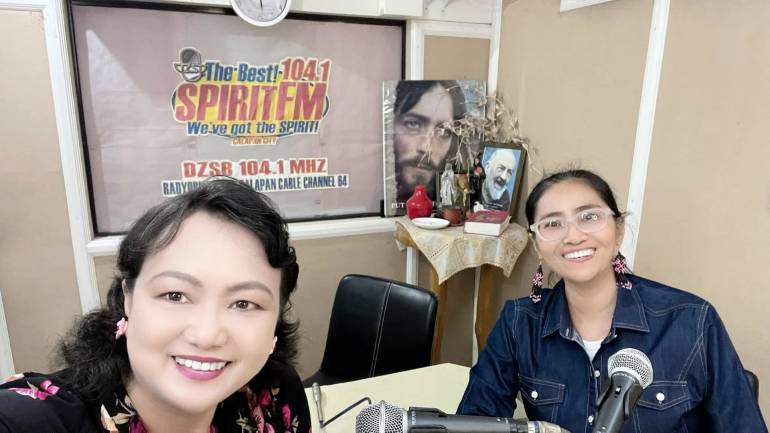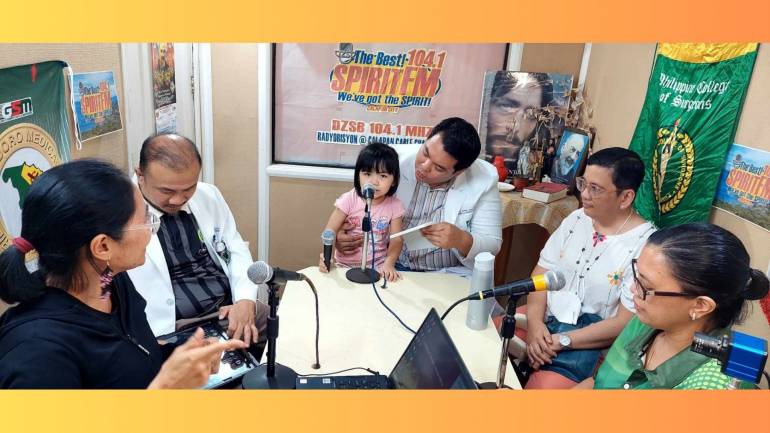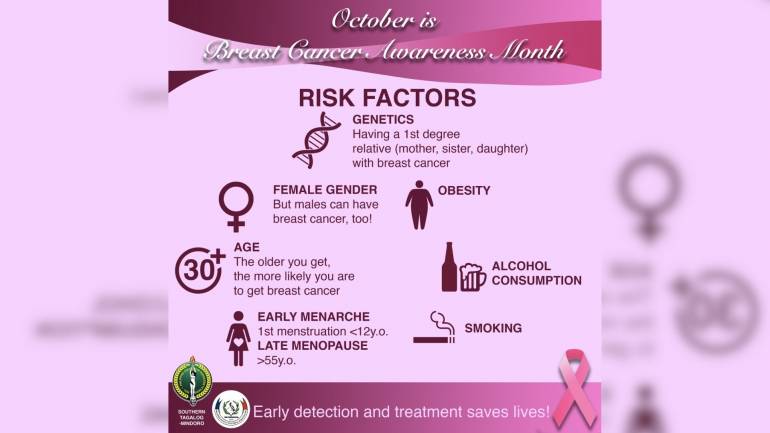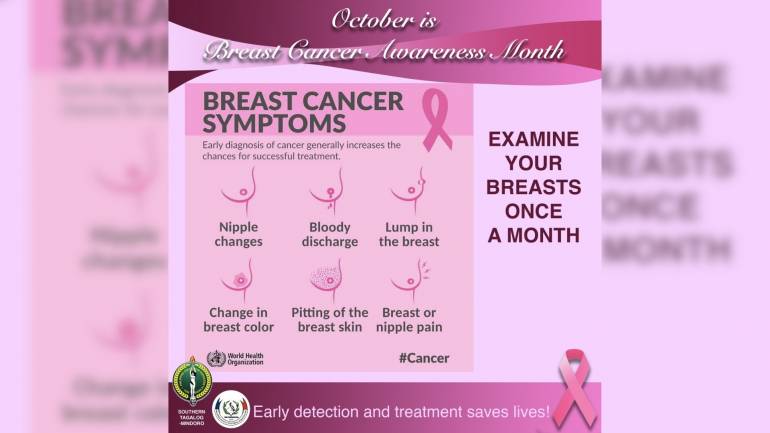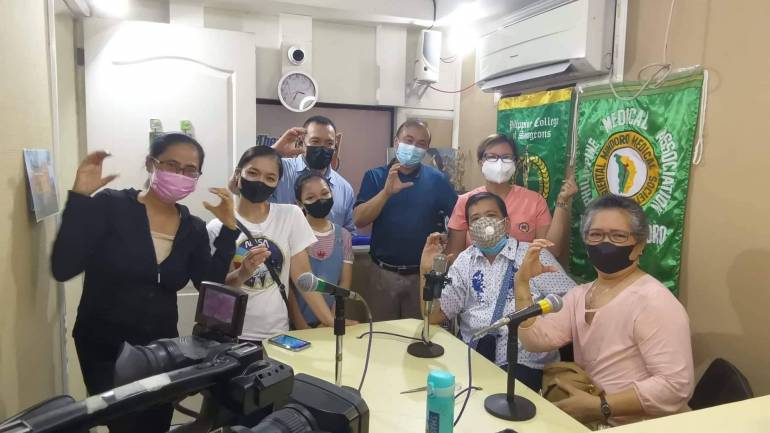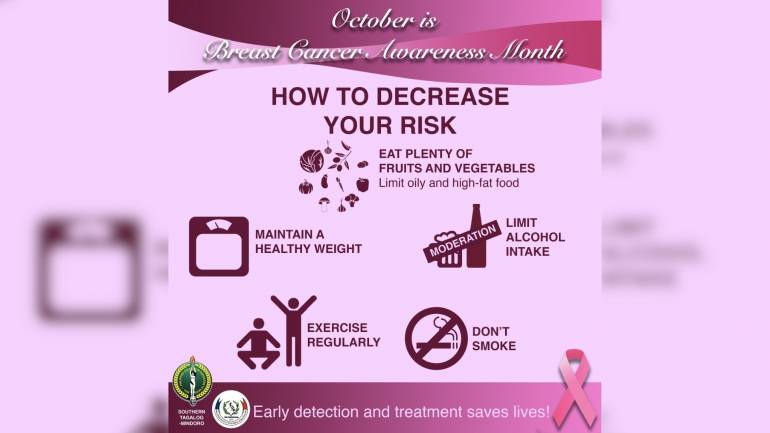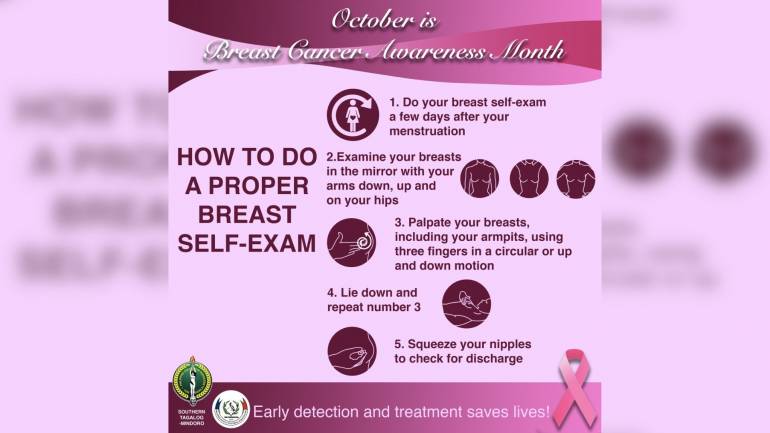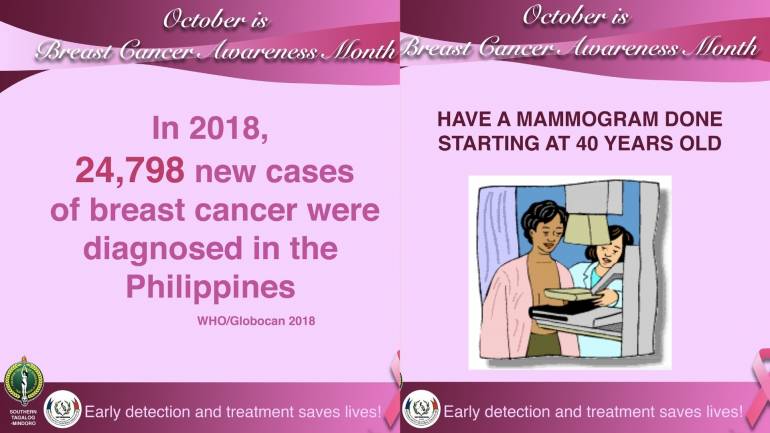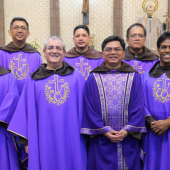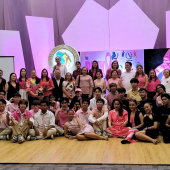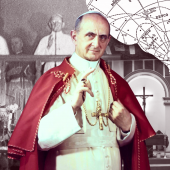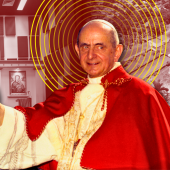Breast cancer patients turn “warriors” and “victors”, urge everyone – go for early detection, don’t fear!
Dr. Patty Caballero-Cabral, a Stage 3 breast cancer patient, says she has had several monitoring visits since 2013 and all turned out to be normal. However, during the pandemic in 2020, she was not able to undergo mammography and ultrasound because most of her time was spent inside the public hospital, saving the lives of sick patients. The following year, in September, she noticed an asymmetry in her breast size.
“At first, I thought it was just part of menopause. After three months, on December 30, I took the courage to finally submit myself to mammography and ultrasound, and I knew right away that I had a high index of suspicion that I had cancer,” said the 50-year-old.
After one year of treatment, on September 23, as October breast cancer awareness month approaches, after silence at "Ilang: A Sanctuary of Prayer,” managed by a priest-friend, where there was poor internet signal, shared the “realities and hope” that breast cancer patients face on Media Spirit Care on DZSB 104.1 Spirit FM, simulcast on Calapan cable channel 64, and live streaming on Facebook.
Also called “Dok Patty”, she earlier expected the dreaded disease because of her strong family history of it. “My father died from cancer of the liver, lung, and colon; my mom and relatives who are also doctors got breast cancer,” she said.
“Friends and medical colleagues did not fall short of reminders. But I realized everything happened for a reason, and what is important is present,” said the mother of three, her biggest reason to fight: Ian, a graduate of medicine; Sofia, a graduate of medical technology and going to the college of medicine; and Erika, a medical student.
Breast cancer strikes anyone, but mostly women
The Philippines had the highest prevalence of breast cancer among 197 countries in 2017, according to the Philippine Obstetrical and Gynecological Society.
Breast cancer is the most common type of cancer in women in the Philippines, with the highest incidence rate of 17.6%2, accounting for 15% of all new cancer cases and 8% of all cancer deaths in the country.
More than half (53%) of breast cancers in the country are diagnosed in Stages III and IV, while only 2% to 3% of cases are diagnosed in Stage I.
Up to one-third of patients with early-stage breast cancer will subsequently develop metastatic disease, which is the most serious form of the disease and occurs when the cancer has spread to other parts of the body, such as the brain, bones, or liver.
Advanced breast cancer comprises metastatic breast cancer (stage 4) and locally advanced breast cancer (stage 3).
Survival rates for women living with advanced breast cancer are lower than those for women with earlier-stage disease.
The 5-year relative survival rate for stage 3 breast cancer is approximately 72%, compared to around 22% for stage 4 breast cancer.
Men are not spared from breast cancer and deaths from it, according to records from the Philippine Statistics Agency (PSA).
Support System, as important as early detection of breast cancer
About three years ago, when Maila Saab, was undergoing chemotherapy for Stage 4 cancer with her husband, they decided to shave their hair way ahead of the procedure as they were sure she would lose hair.
“So, he shaved my hair (me) not knowing he was crying while doing it and immediately he finished mine, then he shaved his hair too. Days after, we found the male members of our church, both young and old, shaved their hair, too,” she said.
“My only daughter with long and curly hair, like, jokingly said she could try too, and we said, Oh no, please, no need. Some kids broke their piggy banks just to contribute to my surgery,” said Maila, whose first mammography results on January 25, 2020, came as a big surprise because she had no signs of breast cancer.
"The support system is very important for a breast cancer patient—emotionally, physically, financially, and most importantly, spiritually. First is God, then one’s natural and spiritual family, and the doctors who are not only doctors to me but special friends,” said Maila.
"All these are interlinked to overcome the battle. As I call mine as a ‘health project’ which has definitely an end in the way God will be glorified!” said Maila in high spirits.
She adds that the project is beautifully taking its course to its final output believing in total remission with her latest September PET scan showing a stable disease at stage 4, meaning tumors stay about the same size and no new tumors appear.
Jessamine Evangelista-Magcamit, 33, says her mother Bella, a stage 2 breast cancer patient, actually promotes healthy living in the family through proper foods and exercise.
"Why my good mother?" she initially questioned God. "But I realized it's God’s way to give all the love she deserved because even when she was still a student, she was already working for her siblings, then for her children," she said.
Public school teacher Roderick Jose Calivara says it's really difficult to be the husband of a breast cancer patient, but the journey is the ultimate test of what love really is—blindness to the wife's physical degeneration and a commitment to "walking with her every step of the journey".
This means being an “emotional and financial provider with God as the Ultimate Provider,” he says. His wife, Doreen, also a public school teacher, says the available assistance they get from the government is not enough.
Among these are the Philippine Health Insurance Corporation, the city government’s health care, social welfare, and development offices of the region, province, and city; the Philippine Charity Sweepstakes Office, the Alliance of Concerned Teachers, and the discount for Persons with Disability.
“After all, I am overwhelmed and grateful to all who support me in any way, including messaging about how I am doing,” said Doreen, who initially brushed aside the lump she felt on her left breast until friends insisted she get a laboratory test.
She was afraid to know if she was sick because her 68-year-old mother, who has heart problems, may not be able to bear it.
But she managed the information well; one day, she came home and told her mother she had the surgery done all right.
With all the Calivara–Despues family’s volunteer works in the Catholic church and communities, members of the Anak ng Teatro (theater group), who are like children to them, organized a dinner concert for a cause dubbed "Susong Matapang, Susong DSusuKo!, meaning brave breast never surrenders.
The letter “D” stands for Doreen and “Ko” stands for the initiative and commitment in the fight against cancer. They also sold t-shirts and ballpens with advocacy texts for breast cancer awareness, and did other fundraising activities, aided by their Facebook page “DSusuko”.
Oncologist Dr. Abigail Garcia-Barrientos says patients are included in her "medical team" because their stories are powerful for others to learn from. As she says, “cancer is never a walk in the park” and has to be a “shared journey and decision with family members, thus reducing anxieties and helping in the acceptance process.”
Like in Mindoro Island's only oncology unit at Maria Estrella General Hospital which is one big space without curtains or barriers, patients get a “feeling of community” where they call each other “classmates or batchmates" This is patterned after the Veterans Hospital.
“We always give words of encouragement and ask the patient what she or he wants. At times, I’d ask some patients to talk with the others. When patients leave the unit for home, others will tell them to come back if they have no one to talk with,” said Barrientos.
“At the unit, patients get to appreciate their blessing if their situation is better than another, and also to get inspired by others. I encourage patients to go back to work so they don’t dwell on self-pity and depression,” said Barrientos.
No longer a death sentence
Dok Patty says the antidote to fear is prayer. But she is also taking advantage of what science offers and innovative treatments, offering women a greater chance than ever before to live healthy, fulfilling lives following their diagnosis.
With her Mindoreña doctor Minda Zarah Perez, a surgeon, radiation oncologist Dr. Jon Arcillas, medical oncologist Barrientos, and Dr. Agnes Grospe, they went for the highest treatment of chemotherapy sessions using the innovator drugs, 33 shots of Tomo-Radiation treatment, and currently she is on hormonal oral anhydrase inhibitor treatment.
With advances in breast cancer treatment, survival rates are improving, and there is an increased focus on quality of life for survivors, Dok Patty agrees.
By reducing side effects and other complications, innovative treatments (such as targeted therapy) have given women the opportunity to reclaim their lives after treatment, returning to work, family, and other activities with greater confidence and energy.
But Dok Patty thinks that despite improvements in breast cancer care, many patients still lack targeted therapeutic options outside of standard chemotherapy and hormonal therapy to reduce the risk of recurrence because of poverty, lack of information to access the best doctors and treatments, fear of knowing the truth about cancer, and huge expenses.
Dr. Arthur Sebastian, a surgeon, emphasizes that there is a cure to breast cancer, that it is no longer a death sentence, and that survivorship has come a long way in recent years.
"Most of the success stories had their surgery done at an early stage, but I have one on stage 3a (large mass, no skin or lymph node involvement) of a diabetic lady that I operated on way back in 2005. She still follows up once a year, although she is based in another province, Laguna. She was 46 when she underwent surgery and postop adjuvant treatment,” he said.
He agrees that the healthcare framework should shift to prioritize early detection and comprehensive patient care.
Finance and fears
Since breast cancer is hormonal, it strikes mostly women who are confronted with several stresses and fears—the stigma associated with it like a death sentence, being a burden to the family, appearing ugly, the pains from treatment, false information like it is incurable, and most of all, the expenses it would entail.
So many patients hide the disease from others until it manifests intolerable symptoms, which is typically at a late stage.
In their breast awareness campaigns, doctors in Oriental Mindoro province appeal for early detection and treatment, especially for those with high-risk factors like genetics, obesity, a history of smoking and alcohol consumption, unhealthy eating, a sedentary lifestyle, and stressful living.
"Don’t fear us, doctors. Please help us to help you; we are instruments of God," says Dr. Michael de la Paz, head of the surgery department at Oriental Mindoro Provincial Hospital, in a radio conversation with this writer on Sept. 30.
Dr. Mervin Tan, a surgeon, tells people not to be afraid of a lump because not all are cancer. And for women who mind keeping their breasts preserved, “there are surgical options like breast conservation surgery, the use of implants, and plastic reconstruction.”
Breast cancer warrior Maila Saab says that as she “shares her experiences and learnings in other places in the country, she feels more for the poor living in areas where information, doctors, facilities, and financial assistance are least accessible”.
Even Dok Patty has to ask for help and shares where to ask for assistance, both government and non-government.
Doctors dela Paz and Barrientos wish that with the National Integrated Cancer Control Act (NICCA), the Oriental Mindoro provincial hospital will soon finally be converted into a regional hospital under the Department of Health for better and more complete services for cancer patients, so islanders do not need to travel to Batangas and elsewhere, like for radiation therapy.
“We lose patients if there are no facilities because travel means additional expenses,” said Barrientos.
Arnan Panaligan of the First District of Congress reintroduced the bill for the conversion in August 2022. "Hopefully, by November, the House will pass the bill. It will then go to the Senate. Hopefully it will also pass the Senate,” he said when asked for updates.
In the MIMAROPA (Mindoro Oriental and Occidental, Marinduque, Romblon, and Palawan) region, the PSA recorded deaths due to malignant neoplasm of the breast at 190 in 2020 and 225 in 2021. Fifty-four and 70 are from Oriental Mindoro, respectively.
Three of these deaths in the region were men.
As the barangay elections approach on October 30, healthcare advocates say the candidates’ agenda on health should be considered by voters.
Dr. Cecille Montales, also a breast cancer survivor, who hails from Victoria, Oriental Mindoro, said, "If the local government is interested in addressing breast cancer, it can get in touch with the ICanServe (ICS) Foundation.
ICS is a non-government organization that pioneered ‘Ating Dibdibin’, a community-based breast cancer program, which they did for the city of Taguig in 2012, where she was executive assistant for health.
On Sept. 14, the foundation, in its 24th year, launched “You Can Do This: A Breast Cancer Patient’s Manual”, downloadable online to support breast cancer patients, survivors, and their caregivers for free, written in both Filipino and English.
ICS is an advocacy group of breast cancer survivors and volunteers that promotes early breast cancer detection, access to accurate diagnosis and timely treatment, survivorship and palliative care, patient navigation, and hospice care.
Tan says early detection will also spare a patient from huge treatment expenses and better chances for a cure than when cancer is already in a late stage.
Meanwhile, patients Maila, Doreen, and Dok Patty agree with their oncologist, Barrientos, that what is important is to face the present with positivity and treat each day as if it were the last.
Maila is still very thankful to God that she is still alive and able to live out God’s purpose in her life.
“One of these, I believe, is to encourage those facing this kind of battle and help prevent others from going through this painful but very colorful journey with a lot of learning experiences and unforgettable encounters, which will make us better people and not miss each day to be thankful to the Lord for this miracle of life and use for His glory!”
“From breast cancer patient to warrior, she is not just a survivor but an overcomer,” she says.
And for Dok Patty: “When I sought refuge to God in silence in a retreat center, that’s when I was able to listen better to myself and to Him and decide with a time-framed concrete and powerful plan in my journey—soul care and hope on top of the realities of living as a breast cancer patient. But one truth holds for everyone: anyone can die anytime; there are other causes, not just breast cancer,” she said.
(This story is published with the support of the Philippine Press Institute, Novartis and ICanServe Foundation.)
Radio Veritas Asia (RVA), a media platform of the Catholic Church, aims to share Christ. RVA started in 1969 as a continental Catholic radio station to serve Asian countries in their respective local language, thus earning the tag “the Voice of Asian Christianity.” Responding to the emerging context, RVA embraced media platforms to connect with the global Asian audience via its 21 language websites and various social media platforms.





